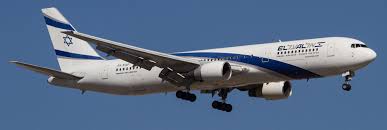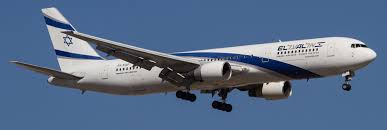
To claw back market share dented by relentless competition from low-cost carriers and a damaging dispute with pilots, Israel's national airline, El Al, is betting on a billion-dollar overhaul of its ageing fleet.
Thanks to the kind of stringent security that sees it equip planes with missile defense systems, El Al was once the go-to airline for most Israelis. In comparison to its competitors which offered newer jets fitted with the latest in hi-tech entertainment and comfort, it has frustrated customers over the past decade with an ageing fleet that has borne poor comparison.
14 of the 19-strong long-haul fleet of Boeing 767s, 747s and 777s of the airlines is more than 21 years old while the average age of its fleet is 18 years. But with a fleet that averages four years for its long-haul 777s and Airbus A330s, in contrast Turkish Airlines, the second-largest carrier operating in Israel after El Al, has a much younger fleet.
Acknowledgement of the upgrading the fleet was a pressing need for the company was Dganit Palti, El Al's chief financial officer. In a $1.25 billion deal, the first of 15 787 Dreamliner planes would be received by the carrier starting next year. It also has an option to buy 13 more 787s, which are 20 percent more fuel efficient.
"In 2020, when we finish replacing all wide-body planes, the average (age) will be six years," Palti told the media. "The Dreamliner and the replacement of the wide-body fleet will give us a big advantage."
Presenting travelers with a wide assortment of prices, flying times and days, and connections, more low-cost airlines like easyJet and Wizz Air were allowed to operate services to Israel by the country’s 2013 open-skies agreement with the European Union and the El Al's fleet issues have been magnified by this.
Its 600 pilots on average were earning $25,000 a month because of generous overtime and other benefits and got into trouble with the airline which hit the airline's profit margins.
Even though a captain on the highest pay level can earn as much as $23,400 a month before tax, by comparison, a pilot at Lufthansa, among the most well paid in Europe, earns on average $190,000 a year before tax.
The dispute, which led to delays and cancellations, has now been resolved. But the loyalty of many Israelis who still prefer to fly El Al because of non-stop flights, tough security and Hebrew-speaking crews would be tested by the row, along with the carrier's ageing fleet, tickets that are often hundreds of dollars more expensive, and fierce competition.
The airline barely retains a third of the market and is losing share by the month from a 50 percent share of all flights to and from Israel a decade ago. Its share price is down by about 12 percent this year.
Jerusalem resident Robby Berman was quoted by the media as saying that he would prefer to fly El Al but each time he does, the video screens and audio don't work and movies are "10 years old".
"I used to love El Al," said Berman, who runs an organ donor society. "But all the airlines upgraded airplanes 10 years ago and El Al is still waiting. They have alienated so many people. I can't see myself going back to them for a long time even if they get new planes."
This is an example of the battle the airline faces to change perceptions.
(Source:www.reuters.com)
Thanks to the kind of stringent security that sees it equip planes with missile defense systems, El Al was once the go-to airline for most Israelis. In comparison to its competitors which offered newer jets fitted with the latest in hi-tech entertainment and comfort, it has frustrated customers over the past decade with an ageing fleet that has borne poor comparison.
14 of the 19-strong long-haul fleet of Boeing 767s, 747s and 777s of the airlines is more than 21 years old while the average age of its fleet is 18 years. But with a fleet that averages four years for its long-haul 777s and Airbus A330s, in contrast Turkish Airlines, the second-largest carrier operating in Israel after El Al, has a much younger fleet.
Acknowledgement of the upgrading the fleet was a pressing need for the company was Dganit Palti, El Al's chief financial officer. In a $1.25 billion deal, the first of 15 787 Dreamliner planes would be received by the carrier starting next year. It also has an option to buy 13 more 787s, which are 20 percent more fuel efficient.
"In 2020, when we finish replacing all wide-body planes, the average (age) will be six years," Palti told the media. "The Dreamliner and the replacement of the wide-body fleet will give us a big advantage."
Presenting travelers with a wide assortment of prices, flying times and days, and connections, more low-cost airlines like easyJet and Wizz Air were allowed to operate services to Israel by the country’s 2013 open-skies agreement with the European Union and the El Al's fleet issues have been magnified by this.
Its 600 pilots on average were earning $25,000 a month because of generous overtime and other benefits and got into trouble with the airline which hit the airline's profit margins.
Even though a captain on the highest pay level can earn as much as $23,400 a month before tax, by comparison, a pilot at Lufthansa, among the most well paid in Europe, earns on average $190,000 a year before tax.
The dispute, which led to delays and cancellations, has now been resolved. But the loyalty of many Israelis who still prefer to fly El Al because of non-stop flights, tough security and Hebrew-speaking crews would be tested by the row, along with the carrier's ageing fleet, tickets that are often hundreds of dollars more expensive, and fierce competition.
The airline barely retains a third of the market and is losing share by the month from a 50 percent share of all flights to and from Israel a decade ago. Its share price is down by about 12 percent this year.
Jerusalem resident Robby Berman was quoted by the media as saying that he would prefer to fly El Al but each time he does, the video screens and audio don't work and movies are "10 years old".
"I used to love El Al," said Berman, who runs an organ donor society. "But all the airlines upgraded airplanes 10 years ago and El Al is still waiting. They have alienated so many people. I can't see myself going back to them for a long time even if they get new planes."
This is an example of the battle the airline faces to change perceptions.
(Source:www.reuters.com)





